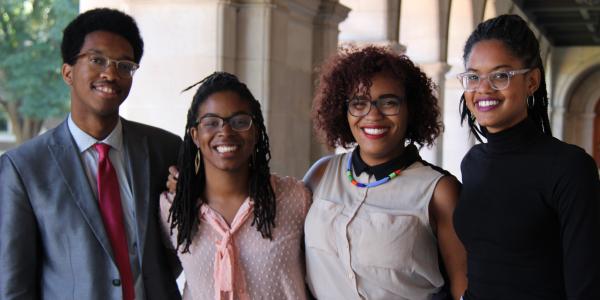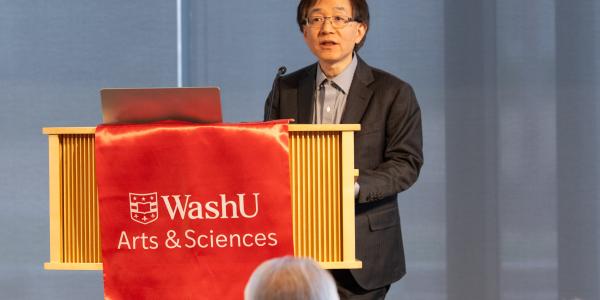"Why are we here?"
The seminar went silent as the nine Mellon Mays fellows in the room contemplated the question that had just been posed to them. As young scholars considering careers in academia, they were forced to face the implications of pursuing a profession that, until quite recently, would not have accepted them. The historic lack of diversity in the academy was the reason the fellows applied to the Mellon program—but why should they care about becoming a part of it?
The Mellon Mays Undergraduate Fellowship originated with eight member universities in 1988, and was created to address the under-representation of minority scholars in the professoriate. The Mellon Fellowship is in its 23rd year at Washington University in St. Louis, and our institution is one of 85 total current members. Over the past couple of decades, the program has become one of the most developed Mellon programs in the nation, and this is highly credited to the weekly seminar that the fellows engage in throughout their junior and senior years. The seminar has been led by a long line of dedicated WashU faculty, and the current director, Dr. Jeffrey McCune, is no exception.
McCune is a professor in women, gender and sexuality studies as well as the performing arts department, and has been at WashU since 2013. His book Sexual Discretion: Black Masculinity and the Politics of Passing was recently named Book of the Year by the National Communications Association’s GLBTQ Communications Studies Division and Caucus on GLBTQ Concerns. His current projects include a second book, Read!:An Experiment in Seeing Black as well as a performance titled “An Archive of Violence.” These endeavors involve understanding narratives surrounding blackness, gender, sexuality, class, and anti-black violence. He has brought his passion for pedagogy and community engagement to the classroom, and if the fellows are lucky, he will also bring along his 4-month-old son, Caleb.
The scholar-activist spirit reflected in McCune’s work has quickly become an integral part of the Mellon agenda at WashU. McCune argues that the nature of Mellon has in fact always been at the intersection of academia and activism:
“Underrepresented students doing rigorous research on understudied and under-theorized subject matter is a performance of activism in itself. For some, it may be an extension of the activist work they do within communities; for others, it may be an isolated commitment. Either way, the active pursuit of knowledge by those who are usually left out of knowledge production, or sometimes discounted in potential, is an activism which requires great courage. For the realization that what we research and discover activates new knowledge, but also new consciousness for individual researchers and communities, is premium.”
Mary Laurita, an assistant dean in the College of Arts & Sciences and the administrative coordinator of Mellon at WashU, agrees. She works closely with McCune and her administrative assistant, Shea Ballantine, to keep everything running smoothly. Laurita has been vital to the growth of the program since its inception under James E. McLeod, beloved late Dean of the College. When asked about the most powerful aspect of the Mellon program, both Laurita and McCune responded: the fellows themselves.
“The fellows are always an amazing group,” Laurita adds. “I get to see them through the application process in their sophomore year, and I just watch them become these amazing scholars who produce a great piece of work by the time they graduate. And people change through doing that kind of work because you gain confidence in your intellectual abilities—that truly changes a person and their outlook on life."
This transformation can be essential for many students from minority groups, who often wish to articulate their own experiences, and those of others living in the margins. The current senior fellows exemplify this through their projects, dealing with topics ranging from the political economy of DVD piracy in Peru, gender and blackness in Claudia Rankine’s Citizen: An American Lyric, Maasai participation in Tanzanian tourism, to queerness and community building in the French Caribbean. While the junior fellows have only been active for a few months, they have also proven to be impressive leaders in the program. Whether it is documenting oral histories from Ferguson activists, or writing the screenplay for this year’s Black Anthology production, they have used their critical thinking skills to navigate their role as intellectuals and community members.
Mentorship plays a crucial role in this engagement, and fellows will find a faculty mentor to guide them through the process of crafting and executing a two-year project. While sophomores may have difficulty seeing themselves as researchers of this caliber, the program provides a plethora of resources to support students through this process. In addition to emphasizing the role of mentors, the Mellon fellowship is fully funded, and students in the program receive stipends throughout the year to conduct projects both domestically and abroad. Yet, all the current fellows agree that “fellowship” means so much more. Through the seminar, guest lectures, regional conferences, and sponsored discussions, the Mellon fellows create a collaborative space where they not only engage with each other's intellectual work but create lasting relationships.
So, what happens to fellows after graduation? Current Mellon fellow, Margaret Abbey, sums it up quite nicely: “Once a Mellon, always a Mellon.” The national foundation provides support to fellows through conferences, seminars, and grants to assist them in scholarly pursuits after undergrad. This sense of continuity has also held true for the program here at WashU, which has invited several alumni to return as guest speakers. Laurita also hopes to reestablish a formal alumni mentorship program that would allow undergraduate fellows to shadow professors in their field of study, as many WashU Mellon alumni have continued on to successful careers in the academy. The program currently boasts 25 fellows with PhDs and 13 scholars in the process of receiving their doctorates. These alumni work at a variety of top universities such as NYU, Harvard, Stanford, Emory, U Chicago, Columbia, Duke, Princeton, UVA, and more. The fields in which they work are just as diverse—anthropology, history, English literature, economics, music, Spanish, art history, and political science, just to name a few.
Through both alumni and current fellows, the program hopes to better engage the WashU community and beyond. Support from the University, the College of Arts & Sciences, and the national Mellon program has allowed this fellowship to flourish, guiding talented young scholars through rigorous independent research. The next step will be to use these talents to emphasize contributions outside of the cohort, in the hopes the answer to the question “Why are you here?” will be simple: To change the academy for the better.
The 2017 Class of Mellon Mays Fellows

Margaret Abbey
Majors: Anthropology: Global Health and Environment
My project broadly explores the food allergy epidemic majorly through an anthropological lens, particularly the discourses surrounding and contributing to the construction of meaning of said epidemic. On the ground and in a virtual field, I study the illness narratives of children who have experienced severe allergic reactions (anaphylaxis), as reported by the mothers of these allergic children in a forum thread specifically created for relating such illness narratives. The overarching goal of this virtual ethnographic study is to situate the intimacies of the food allergy epidemic, and to see to what extent these intimacies contribute to ways in which constructed meaning is navigated and even created by the allergic body itself and those closest to it.

Andie Berry
Majors: English Literature and American Culture Studies
My project, "Shadows of Histories: The Erasure of Minorities in America's Dystopic Future," focuses on September 11, 2001 as a massive cultural event which ignited the phenomenal literary production of young adult dystopian literature. I plan to argue that in this post-9/11 moment, these fictions are modes of catharsis for the youth generation that has come of age during the subsequent War on Terrorism. Yet, racial representation in these dystopias reveals the highly racialized rhetoric around the terrorist attacks and that racial representation in these dystopias recapitulates our most formative and haunting trauma of slavery, that still remains largely mythologized and unaddressed.

Major: American Culture Studies
Minor: Spanish
My project explores Pruitt-Igoe, a modern- era housing project whose demolition is heralded as a symbol of the failure of modern architecture. Pruitt-Igoe was a result of slum clearance and urban renewal efforts in St. Louis intended to solve the city's housing crisis. Much of the scholarship that exists on Pruitt-Igoe either perpetuates the housing project's mythology (the claim that Pruitt-Igoe's failure is a result of the failure of modern architecture) or explains why the mythology is invalid. My research hopes to complicate this existing scholarship by collecting narratives of people that lived in Pruitt-Igoe. Specifically, my research will look at women who lived in Pruitt-Igoe and their existence at the intersection of segregation, poverty and discrimination in urban public housing. Their complex existence, and the ways in which women in the project navigated and advocated within the space of Pruitt-Igoe, is an essential component in creating a complicated narrative of the project’s deep impact even after its demolition.

Majors: Women, Gender and Sexuality Studies; American Culture Studies
My project will focus on how neighborhoods with high LGBT (Lesbian, Gay, Bisexual, Transgender) populations, colloquially known as “gayborhoods,” influence urban development. In particular my project will focus on the Washington D.C. neighborhood of U Street Corridor, which is situated between 16th Street and Georgia Avenue North West. This historic African-American neighborhood, which host many important cultural landmarks, is also the site of a growing visible gay white male population. The question I will be exploring is, did the introduction of this population and the creation of a “gayborhood” a factor and/or a catalyst in the gentrification of this Washington D.C. region? I also plan to analyze economic and housing policies that have lead to such rapid gentrification in the city.

Sherri Gardner
Major: English Literature
The title of my project is "Buried Theories: The Interplay of Folklore, Identity Formation and Theory Creation in the 20th Century." Through my work I hope to explore Zora Neale Hurston's use of African-American folklore in her literature. I want to examine the unique ways in which Hurston engages with folklore in the hopes of discovering the ways in which oral tradition, formation of identity, and the creation of theory intersect in early 20th century black communities.

Major: American Cultures Studies
Minor: WGSS
Centering LGBTQ+ people of color, I explore how the (un)conscious formation and enactment of non-monogamous desire works as embodied critique and oppositional practice. Desiring in unconventional ways, these people re-shape and re-imagine the ways we relate with one another. Ultimately, I draw upon the heterogeneity of queer of color critiques to examine polydesire (or non-monogamous desire) as a counter-hegemonic space of undoing power relations fraught in monogamy. Put shortly, I look to these sources to destabilize “the couple” in hopes for a more liberated future for sexual and intimate couplings, constellations of polydesirous and interconnected couplings, and the individuals feeling and enacting their desires.





